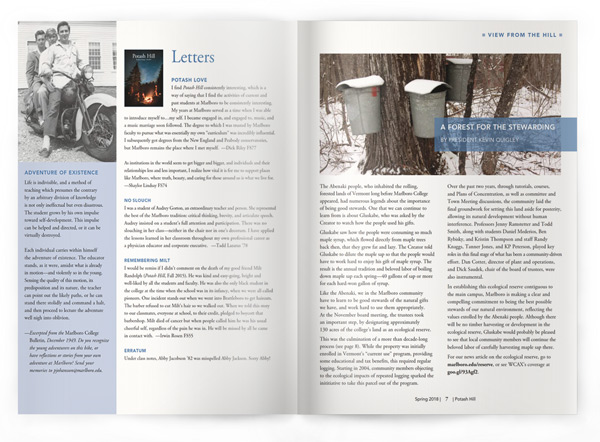View from the Hill

A Forest for the Stewarding
By President Kevin Quigley
The Abenaki people, who inhabited the rolling, forested lands of Vermont long before Marlboro College appeared, had numerous legends about the importance of being good stewards. One that we can continue to learn from is about Gluskabe, who was asked by the Creator to watch how the people used his gifts.
Gluskabe saw how the people were consuming so much maple syrup, which flowed directly from maple trees back then, that they grew fat and lazy. The Creator told Gluskabe to dilute the maple sap so that the people would have to work hard to enjoy his gift of maple syrup. The result is the annual tradition and beloved labor of boiling down maple sap each spring—40 gallons of sap or more for each hard-won gallon of syrup.
Like the Abenaki, we in the Marlboro community have to learn to be good stewards of the natural gifts we have, and work hard to use them appropriately. At the November board meeting, the trustees took an important step, by designating approximately 130 acres of the college’s land as an ecological reserve.
This was the culmination of a more than decade-long process (see page 8). While the property was initially enrolled in Vermont’s “current use” program, providing some educational and tax benefits, this required regular logging. Starting in 2004, community members objecting to the ecological impacts of repeated logging sparked the initiative to take this parcel out of the program.
Over the past two years, through tutorials, courses, and Plans of Concentration, as well as committee and Town Meeting discussions, the community laid the final groundwork for setting this land aside for posterity, allowing its natural development without human interference. Professors Jenny Ramstetter and Todd Smith, along with students Daniel Mederios, Ben Rybisky, and Kristin Thompson and staff Randy Knaggs, Tanner Jones, and KP Peterson, played key roles in this final stage of what has been a community-driven effort. Dan Cotter, director of plant and operations, and Dick Saudek, chair of the board of trustees, were also instrumental.
In establishing this ecological reserve contiguous to the main campus, Marlboro is making a clear and compelling commitment to being the best possible stewards of our natural environment, reflecting the values extolled by the Abenaki people. Although there will be no timber harvesting or development in the ecological reserve, Gluskabe would probably be pleased to see that local community members will continue the beloved labor of carefully harvesting maple sap there.
In addition to Jenny Ramstetter’s feature on our new ecological reserve in this issue of Potash Hill, see our news story, or WCAX’s coverage.
